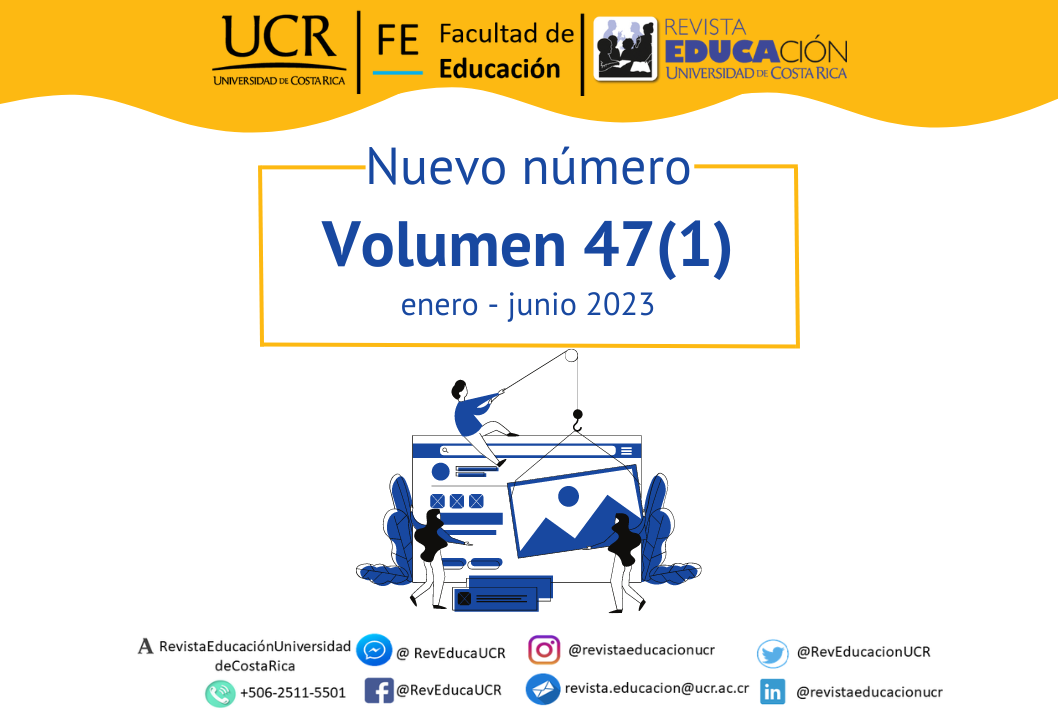Abstract
This work aims to generate evidence of lexical mastery in the context of the semantic relationships of synonymy, antonymy, and theme. This multidisciplinary study analyzed an instrument composed of 21 items, presented to 3864 applicants that took the Academic Aptitude Test (Prueba de Aptitud Académica [PAA] in Spanish) for admission to the University of Costa Rica in 2021, and whose ages ranged from 17 to 21 years. The results show that lexical mastery can indeed be measured in three categories that represent broad and common relationships in reading. The ability to identify these types of relationships affects the applicants’ performance, especially when solving items in the categories of opposition, paraphrase and reduction (all typical to the PAA) that require a level of lexical proficiency. Therefore, it is important to understand the links between lexical mastery and the semantic relationships themselves, free of context, to ensure that the measurement of general reasoning abilities is not affected, or to find mechanisms that avoid factors causing irrelevant variances in the instrument.
References
Berko, J, Wolf, M. y Vellutino, F. (1999). Una explicación psicolingüística de la lectura. En J. Berko y N. Bernstein (Eds.), Psicolingüística (pp. 433-468). McGraw Hill. https://www.academia.edu/38520857/PSICOLINGUISTICA_Segunda_edici%C3%B3n_N_1_4_b
Brizuela, A., Jiménez, K., Pérez, N. y Rojas, G. (2016). Autorreportes verbales en voz alta para la identificación de procesos de razonamiento en pruebas estandarizadas. Revista Costarricense de Psicología, 35(1), 23-36. http://rcps-cr.org/openjournal/index.php/RCPs/article/view/71/90
Brizuela, A. y Montero, E. (2013). Predicción del nivel de dificultad en una prueba estandarizada de comprensión de lectura: aportes desde la psicometría y la psicología cognitiva. RELIEVE-Revista Electrónica de Investigación y Evaluación Educativa, 19(2), 1-23. https://revistaseug.ugr.es/index.php/RELIEVE/article/view/17062/14812
Calvo, K., Rojas, G., Pérez, N. y Ríos, A. J. (2019). Identificación de elementos irrelevantes para la comprensión de ítems de una prueba de razonamiento. Revista Mexicana de Investigación Educativa, 24(81), 463-480. https://comie.org.mx/revista/v2018/rmie/index.php/nrmie/article/view/1273/1212
Daneman, M. y Carpenter, P. A. (1980). Individual differences in working memory and reading [Diferencias individuales en la memoria de trabajo y de lectura]. Journal of verbal learning and verbal behavior, 19(4), 450-466. https://doi.org/10.1016/S0022-5371(80)90312-6
Entwistle, W. 1978. Lenguas de España: castellano, catalán, vasco y gallego-portugués. Ediciones Istmo.
Escandell, M. V. (2007). Apuntes de semántica léxica. UNED.
Escobar, J. y Cuervo, Á. (2008). Validez de contenido y juicio de expertos: una aproximación a su utilización. Avances en medición, 6(1), 27-36. https://www.researchgate.net/publication/302438451
Greenwood, S. C. y Flanigan, K. (2007). Overlapping vocabulary and comprehension: Context clues complement semantic gradients [Vocabulario y comprensión superpuestos: las claves del contexto como complemento de los gradientes semánticos]. The Reading Teacher, 61(3), 249-254. https://ila.onlinelibrary.wiley.com/doi/abs/10.1598/RT.61.3.5
Johnson-Laird, P. N. (1988). How is Meaning Mentally Represented? [¿Cómo se representa mentalmente el significado?]. En U. Eco, M. Santambrogio y P. Violi (Eds.), Meaning and Mental Representations (pp. 99-119). Indiana University Press.
Kleiber, G. (1995). La semántica de los prototipos. Categoría y sentido léxico. Visor Libros, S.L.
Kroeger, P. (2018). Analyzing meaning: An introduction to semantics and pragmatics [Analizando el significado: una introducción a la semántica y la pragmática]. Language Science Press.
Langacker, R. W. (1987). Foundations of cognitive grammar: Vol.1, Theoretical prerequisites [Fundamentos de la pragmática cognitive: Vol 1, Prerrequisitos teóricos]. Stanford University Press.
Lyons, J. (1977). Semantics [Semántica]. (Vol. 2). Cambridge University Press.
May, C., Ferraro, F., McCree, A., Wintrode, J., Garcia-Romero, D. y Van-Durme, B. (2015). Topic identification and discovery on text and speech [Identificación y descubrimiento de temas en el texto escrito y el habla]. En Proceedings of the 2015 Conference on Empirical Methods in Natural Language Processing (pp. 2377-2387). https://aclanthology.org/D15-1285.pdf
Ortiz-Romero, G., Díaz-Rojas, P., Llanos-Domínguez, O., Pérez-Pérez, S. Y González-Sapsin, K. (2015). Dificultad y discriminación de los ítems del examen de Metodología de la Investigación y Estadística. Edumecentro, 7(2), 19-35. https://revedumecentro.sld.cu/index.php/edumc/article/view/474/pdf_71
Reeves, L., Hirsh- Pasek, K. y Golinkoff, R. (1999). Palabras y significado: de los elementos simples a la organización compleja. En J. Berko y N. Bernstein, Psicolingüística (pp. 169-244). Mc Graw Hill.
Rojas, G., Montero, E., Arias, M., Rojas, L., Jiménez, K., Calvo, K., Martínez, D., Pérez, N., Solano, S., Cerdas, D., Ordónez, K., Solano, L. y Valverde, M. (2019). Manual de procesos de la Prueba de Aptitud Académica de la UCR. Programa Permanente de la Prueba de Aptitud Académica, Universidad de Costa Rica.
Varo, C. V. (2014). El procesamiento de las relaciones léxicas. Revista Española de Lingüística, 40(1), 149-171. http://revista.sel.edu.es/index.php/revista/article/view/79/78
Zapico, M. y Vivas, J. (2015). La sinonimia desde una perspectiva lingüístico-cognitiva. Medición de la distancia semántica. Onomázein, (32), 198-211.http://ojs.uc.cl/index.php/onom/article/view/30097/23487
Comments

This work is licensed under a Creative Commons Attribution-NonCommercial-NoDerivatives 3.0 Unported License.
Copyright (c) 2023 Revista Educación - Journal of Education



